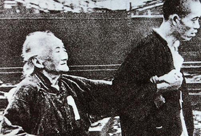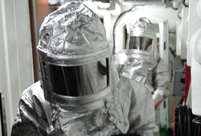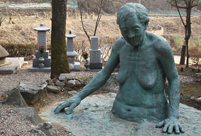 Fighters of Lanzhou MAC in confrontation training
Fighters of Lanzhou MAC in confrontation training
 3D printing to trigger third industrial revolution
3D printing to trigger third industrial revolution
 Top 10 brands that win rich women's hearts
Top 10 brands that win rich women's hearts
 Deng Xiaoping: 'I have a clear conscience all my life'
Deng Xiaoping: 'I have a clear conscience all my life'
 Xi Jinping: 'The people are our strength'
Xi Jinping: 'The people are our strength'
 Amazing cliff diving in cold winter
Amazing cliff diving in cold winter
 Enjoy Sochi 2014 in slow motion
Enjoy Sochi 2014 in slow motion
 University student sentenced to death for poisoning roommate
University student sentenced to death for poisoning roommate
 Chinese lunar New Year celebrated in San Francisco
Chinese lunar New Year celebrated in San Francisco
BEIJING, March 6 -- A panel of six environmental experts has started bidding for governmental and private funding to help build a waste water treatment a plant designed to showcase the best practice in this field.
The panel, led by Qu Jiuhui, an academic with the Chinese Academy of Engineering, aims to build one Concept Waste Water Treatment Plant (WWTP) within five years and add more such facilities from 2030 to 2040.
The plant, which is still in an early phase without even a location specified, comes as Chinese authorities have been stressing the need to improve the country's water treatment infrastructure.
According to the Ministry of Housing and Urban-Rural Development, as of September 2013, China had 3,501 waste water treatment plants at or above county level, dealing cumulatively with 140 million cubic meters of waste water per day.
With the country's urbanization, more rural people will flood into cities, and utilities will be crucial to sustainable development.
However, problems exist in the current waste water treatment plants.
He Xiaoxia, head of the Green Beagle Institute, a Beijing-based non-governmental organization, said that the standard for waste water discharge needs to be lifted in order to avoid pollution in natural water, and accused some water treatment plants of being poorly operated.
Problems such as high consumption of energy, increasing emission of greenhouse gases and a low recycling rate of useful elements also require attention, said Yu Gang, a professor with Tsinghua University and a member of the six-person panel.
"Emerging pollutants in waste water, generated by synthetic material such as drugs and cosmetics, are also bothering environmental experts both home and abroad," according to Yu.
He said that these pollutants are "invisible enemies" which are hard to trace and eradicate in waste water treatment. Once they are discharged into nature, they will be taken in by people via food or water and accumulate in bodies, impacting future generations.
In 1998, Singapore initiated the NEWater project to treat waste water using dual-membrane and ultraviolet technologies in addition to conventional processes, to solve the country's reliance on water imported from Malaysia.
The project received great responses from the world and wrote a new chapter in turning waste water into drinking water, having profound meaning for global waste water treatment, according to Yu.
"Therefore, we are making efforts to build a concept plant in China to tackle the problems of treating urban waste water, aiming at stricter standards of discharged waste water and lower energy consumption," he said.
The Concept WWTPs' improvements will include increased recycling of resources such as nitrogen and phosphorus, two elements that must be separated from waste water but are needed to add nutrients to fertilizer; while the plan is for the plants to be "community-friendly" near households.
The experts are also in search of methods to fight Yu's "invisible enemies."
He explained, "We call it a concept plant as we are still in the first phase of its design, and we will release details of where it will be sited and the construction funds behind it at the end of this year."
On Wednesday, Chinese Premier Li Keqiang delivered his first government work report at the opening meeting of the national legislature's annual session, showing his concern over increasing pollution in air, water and soil.
He announced that an action plan on clean water will come out this year to reinforce protection of drinking water sources and treatment of polluted water.
In February, the Ministry of Environmental Protection proposed an investment of two trillion yuan (325.9 billion U.S. dollars) to prevent and treat water pollution, higher than the air pollution treatment funds of 1.7 trillion yuan.
Environmentalist Yang Bin believes the concept plant is technically feasible.
As the population continues growing, China will finally step on the path to properly recycle waste water, Yang predicted.
 Chaihe village, pure and peaceful fairyland in snow
Chaihe village, pure and peaceful fairyland in snow Belgians warmly welcome arrival of China's giant pandas
Belgians warmly welcome arrival of China's giant pandas Female marines receive tactical training in NW China
Female marines receive tactical training in NW China Blood memory: Nanjing Massacre in 1937
Blood memory: Nanjing Massacre in 1937 Top 10 pure beauties in showbiz
Top 10 pure beauties in showbiz British WWII veteran: I can't forgive Japan
British WWII veteran: I can't forgive Japan Tongban's dream of prosperity
Tongban's dream of prosperity Chinese frigate Yancheng holds drills in Mediterranean Sea
Chinese frigate Yancheng holds drills in Mediterranean Sea A visit to comfort woman's home in South Korea
A visit to comfort woman's home in South Korea Fairyland? Qingdao in sea of clouds
Fairyland? Qingdao in sea of clouds Top 10 most handsome faces in Asia in 2013
Top 10 most handsome faces in Asia in 2013 Female celebs with beautiful long legs
Female celebs with beautiful long legs Cat 'guardians' in Forbidden City
Cat 'guardians' in Forbidden City Large numbers of ancient coins excavated in Inner Mongolia
Large numbers of ancient coins excavated in Inner Mongolia Leisurely life beneath Zhonggulou, where time travels slower
Leisurely life beneath Zhonggulou, where time travels slowerDay|Week|Month